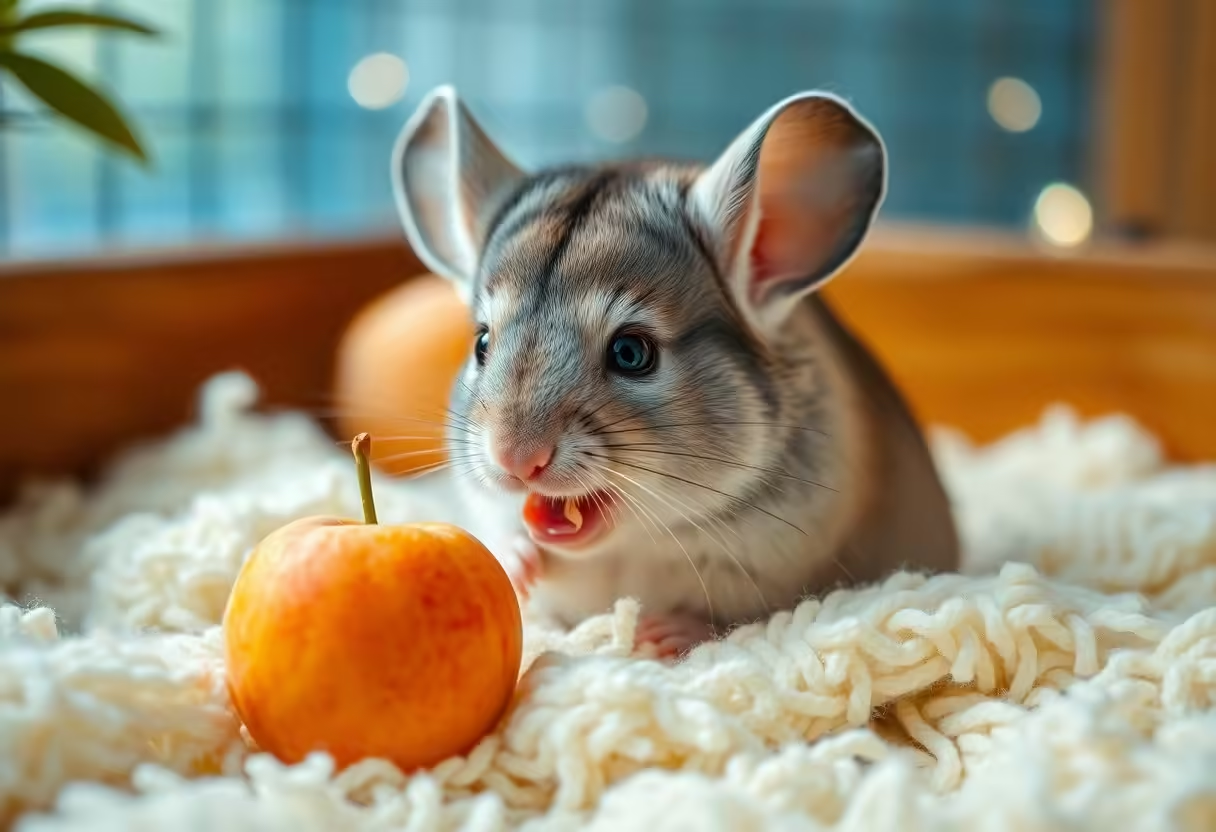Caring for your chinchilla requires understanding their dietary needs, especially given their sensitive digestive systems. Knowing which foods are safe is crucial to keeping your pet healthy. One common question is whether apricots are a suitable addition to a chinchilla’s diet. This article provides a comprehensive answer, ensuring you have the information needed to make an informed decision.
Key Takeaways
- Apricot seeds and pits are toxic to chinchillas due to the presence of amygdalin, which can release cyanide, a deadly poison.
- Fresh apricot flesh can be fed to chinchillas in moderation, but ensure the fruit is seedless and pit-free. Limit intake to no more than 1-2 teaspoons per pound of body weight as apricots are high in sugar.
- Dried apricots should be avoided due to their high sugar content and potential to cause digestive issues. Stick to hay, pellets, and limited amounts of fresh vegetables and fruits as the primary components of their diet.

Nutritional Value of Apricots
Apricots are rich in nutrients, offering vitamins, minerals, and dietary fiber. While this can seem beneficial, it’s essential to balance the potential nutritional benefits with the risks for chinchillas.
Vitamins and Minerals
Apricots contain vitamins A and C, potassium, and iron—nutrients that support immune function, healthy vision, and overall health. However, chinchillas receive these nutrients primarily from their pellets and hay, making the added nutritional value from apricots unnecessary.
Fiber Content
Apricots are also a source of dietary fiber, which aids in digestion. While chinchillas need fiber to maintain a healthy digestive system, too much fiber from fruits like apricots can cause gastrointestinal distress, leading to issues like diarrhea. Keeping apricot servings small and occasional is crucial for maintaining a balanced diet.
Chinchilla Dietary Needs
Chinchillas are herbivores with highly specialized dietary needs. Their diet should consist mainly of high-fiber foods, while sugary treats should be limited to prevent health issues.
High-Fiber Diet
Chinchillas thrive on a diet rich in fiber, which helps maintain healthy teeth and supports digestion. Hay should make up about 75-80% of their diet, as it helps prevent dental issues and keeps their digestive systems functioning properly.
Limit Sugar Intake
Chinchillas have very sensitive digestive systems and cannot process sugar well. Foods like apricots, which contain high amounts of sugar, should only be offered as rare treats. Too much sugar can lead to obesity, diarrhea, and bloating.
How to Safely Feed Apricots to Chinchillas
Yes, chinchillas can eat fresh apricots, but only in small quantities and with proper precautions.
Fresh Apricots
You can offer 1-2 teaspoons of fresh apricot per pound of your chinchilla’s body weight as a treat. Be sure to remove the pit, seed, and stem before feeding. Too much apricot can overwhelm their system due to its sugar content, so it should never make up more than 10% of their daily intake.
Dried Apricots
Avoid feeding dried apricots to your chinchilla. The drying process concentrates the sugars, which can lead to digestive issues like diarrhea and bloating. Regular consumption of dried apricots can also contribute to long-term health problems such as obesity and dental decay.
Risks of Feeding Apricots to Chinchillas
Despite their appealing taste, apricots can pose serious health risks if not fed properly.
Choking Hazards
Apricot seeds and pits contain amygdalin, a compound that can release cyanide when ingested. This can lead to respiratory distress or death if consumed. Always ensure that any apricot offered is free from seeds, pits, or stems to avoid choking and poisoning risks.
Digestive Issues
Apricots’ high sugar content can upset the delicate balance of gut bacteria in chinchillas, causing digestive issues like diarrhea, bloating, and stomach pain. Introducing apricots or any new food should be done gradually to minimize the risk of gastric upset.
Safe Alternatives to Apricots
There are many healthier treats available for your chinchilla that don’t pose the same risks as apricots.
Safe Fresh Fruits
Fruits like strawberries, blueberries, and raspberries are safer options for chinchillas in small amounts. These fruits are lower in sugar and provide antioxidants, vitamins, and fiber without overwhelming their system.
Healthy Treat Options
Hay-based treats, small pieces of carrots, and occasionally dried fruits like cranberries (unsweetened) can also be great options. Be mindful that all treats should be offered in moderation, with the main focus remaining on hay and pellets for balanced nutrition.
Summary
Chinchillas can eat apricots, but only in moderation and with careful preparation. Ensure the apricot is fresh, washed, and free of seeds, pits, and stems. Given the high sugar content, apricots should be limited to a rare treat rather than a staple in their diet. By adhering to these guidelines, you can enrich your chinchilla’s diet without compromising their health.
FAQ
Q: Are apricots safe for chinchillas?
A: Yes, fresh apricots are safe in small amounts. Always remove the pit, seed, and stem, and limit the portion to 1-2 teaspoons per pound of body weight. Avoid dried apricots due to their high sugar content.
Q: How often can I feed apricots to my chinchilla?
A: Apricots should only be given 1-2 times a week as a treat. Ensure that the total fruit intake doesn’t exceed 10% of their daily diet.
Q: Can chinchillas eat dried apricots?
A: No, dried apricots are high in sugar and can cause digestive issues. It’s best to avoid feeding dried apricots to your chinchilla.
Q: What are the nutritional benefits of apricots for chinchillas?
A: Apricots provide fiber, vitamins A and C, and potassium. However, due to their sugar content, they should only be an occasional treat, not a regular part of their diet.
Q: Can I give my chinchilla apricot jam or preserves?
A: No, jams and preserves are too high in sugar and often contain preservatives that can harm your chinchilla. Stick to fresh fruits for safe treats.
